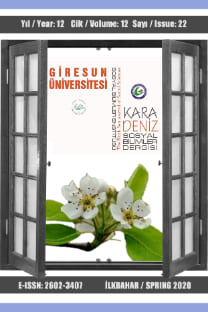Sürdürülebilir Kalkınma Kapsamında Yeşil Lojistik: Avrupa Birliği ve Türkiye Örneği
Yeşil Lojistik, Sürdürülebilir Kalkınma, Sera Gazı Emisyonu, Karbondioksit Emisyonu
Green Logistics Context of Sustainable Development: The Case of The European Union and Turkey
Green Logistics, Sustainable Development, Greenhause Gas Emission, Carbon Dioxide Emission,
___
- Aldakhil, A.M., Nassani, A.A., Awan, U., Abro, M.M.Q ve Zaman, K. (2018), Determinants of Green Logistics in BRICS Countries: An Integrated Supply Chain Model for Green Business, Journal of Cleaner Production, 195, 861-868.
- Breusch, T.S. ve Pagan, A.R. (1980). The Lagrange Multiplier Test and Its Applications to Modelspecification Tests in Econometrics, Review of Economic Studies, 47(1), 239-53.
- Cui, Q. ve Li, Y. (2015), An Empirical Study on the Influencing Factors of Transportation Carbon Efficiency: Evidences From Fifteen Countries, Applied Energy, 141, 209-217.
- Dereli, M. ve Aytaç, A. (2019), Uluslararası Ticaret ve Çevre İlişkisi Kapsamında Yeşil Lojistik Kavramı: Avrupa Birliği ve Türkiye, Sosyal ve Beşeri Bilimlere Multidisipliner Bakış, 41, 68-100.
- Driscoll, J.C. ve Kraay, A.C. (1998). Consistent Covariance Matrix Estimation with Spatially Dependant Panel Data, Review of Economics and Statistic, 80(4), 549-560.
- Khan, S.A.R. (2019), The Effect of Green Logistics on Economic growth, Social and Environmental Sustainability: An Empirical Study of Developing Countries in Asia, Preprints, 2019010104 (doi: 10.20944/preprints201901.0104.v1).
- Khan, S.A.R., Zhang, Y. ve Nathaniel S. (2020), Green Supply Chain Performance and Environmental Sustainablity: A Panel Study, LogForum, 16(1),141-159.
- Lai, K.H. ve Wong, C.W., (2012), Green Logistics Management and Performance: Some Empirical Evidence From Chinese Manufacturing Exporters, Omega, 40, 267-282.
- Mariano, E. B., Gobbo Jr, J. A., De Castro Camioto, F. ve Nascimento Rebelatto, D. A., (2017). CO2 Emissions and Logistics Performance: A Composite Index Proposal, Journal of Cleaner Production, 163, 166-178.
- Nakamichi K., Hanaoka S. ve Kawahara Y. (2016), Estimation of Cost and CO2 Emissions with a Sustainable Cross-Border Supply Chain in The Automobile Industry: A Case Study of Thailand and Neighboring Countries, Transportation Research Part D: Transport and Environment, 43, 158–168.
- Öncü, E. ve Özdemir, Ö., (2020), Ekonomik Büyüme ve Ulaştırma Altyapı Kalitesinin CO2 Emisyonuna Etkisinin İncelenmesi, Nişantaşı Üniversitesi Sosyal Bilimler Dergisi, 8, 45-54. Pesaran, M.H. (2004). General Diagnostic Tests for Cross Section Dependence in Panels, Cambridge Working Papers in Economics, No: 435.
- T.C. Dışişleri Bakanlığı, Avrupa Birliği Başkanlığı, Sektörel Politikalar Daire Başkanlığı (2020). Fasıl 27: Çevre ve İklim Değişikliği, Avrupa Birliği’nin Çevre ve İklim Değişikliği Politikası, Erişim Adresi: https://www.ab.gov.tr/fasil-27-cevre_92.html (22.11.2020)
- T.C. Kalkınma Bakanlığı Onuncu Kalkınma Planı Özel İhtisas Komisyonu Raporu (2014), Lojistik Hizmetlerin Geliştirilmesi (Yayın No: KB: 2884- ÖİK: 729). http://www.sbb.gov.tr/wp-content/uploads/2018/10/10_LojistikHizmetlerininGelistirilmesi.pdf (22.11.2020)
- Takım, A. (2015). Uluslararası Ticarete Giriş Kavram, Teori, Politika ve Uygulama, Bursa: Ekin Yayınevi.
- Tatoğlu, F.Y. (2013), Panel Veri Ekonometrisi Stata Uygulamalı, İstanbul: Beta Yayınevi. Wang, D.F., Dong, Q-L., Peng, Z-M., Khan, S.A.R., ve Tarasov, A. (2018) The Green Logistics Impact on International Trade: Evidence from Developed and Developing Countries Sustainability, 10, 1-19.
- Yılmaz, G.A. ve Yıldırır Keser, H. (2018), Uluslararası Taşımacılık Sektörünün Etkinliğinde Yeşil Lojistik, IV. Uluslararası Kafkasya-Orta Asya Dış Ticaret ve Lojistik Kongresi Didim/Aydın 2018, 638-646. http://ulk.ist/media/kitap/IV-UKODTLK/uluslararasi-tasimacilik-sektorunun-etkinliginde-yesil-lojistik.pdf (22.11.2020)
- Yu, Z., Golpira, H. ve Khan, S.A.R. (2018), The Relationship between Green Supply Chain Performance, Energy Demand, Economic Growth and Environmental Sustainability: An Empirical Evidence from Developed Countries, LogForum,14 (4), 479-494.
- ISSN: 2602-3407
- Yayın Aralığı: 2
- Başlangıç: 2009
- Yayıncı: -
Son Osmanlı Mebusan Meclisi Seçimlerinde Trabzon Sancağı (İttihatçı-İtilafçı Mücadelesi)
Sürdürülebilir Kalkınma Kapsamında Yeşil Lojistik: Avrupa Birliği ve Türkiye Örneği
Psikolojik Tipler Ve Jung Psikolojisi Üzerine Bir Değerlendirme
Nişanlılar Romanında Salgının Tarihi Gerçekliği ve Kurguya Yansıyan Dehşeti
Türkiye ve AB Ülkelerinin AR-GE Verimliliklerinin EntropiEATWOS Yöntemleri ile Karşılaştırılması
Birinci Meclis’te Bir Muhalif: Mersinli Cemal Paşa
Türkiye’de Elektronik Devletten Dijital Devlete Doğru
H. Alpay KARASOY, Pelin BABAOĞLU
Türkiye ve AB Ülkelerinin AR-GE Verimliliklerinin Entropi-EATWOS Yöntemleri ile Karşılaştırılması
Birinci Mecliste Bir Muhalif: Mersinli Cemal Paşa
Kamu Yönetimi Alanında Yazılan Etik Konulu Lisansüstü Tezlerin İçerik Analizi
